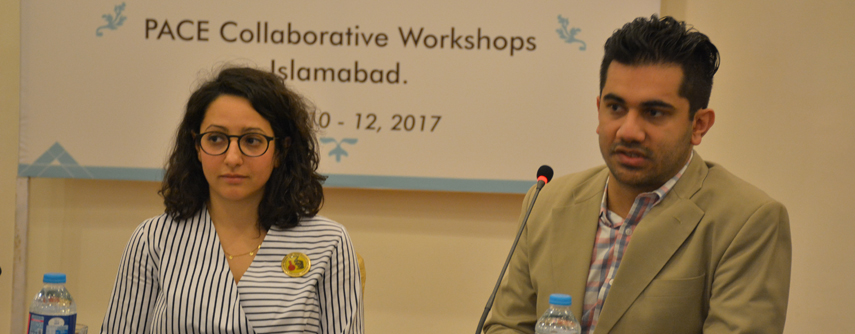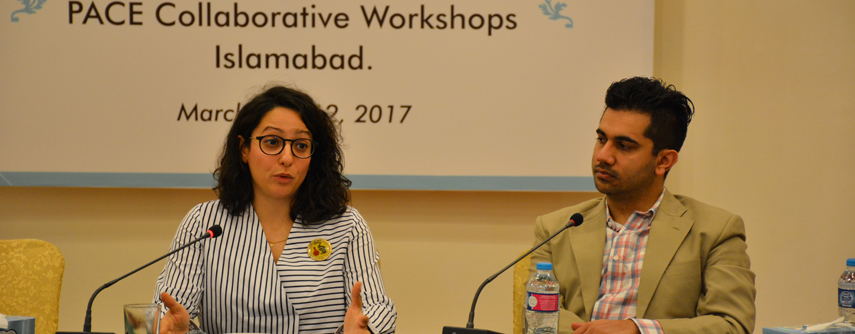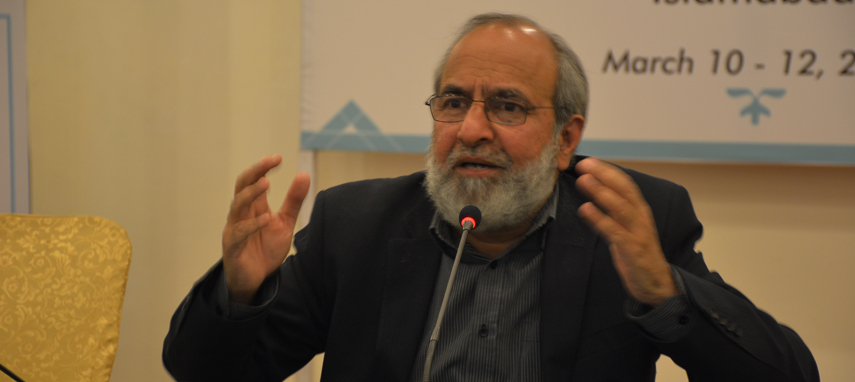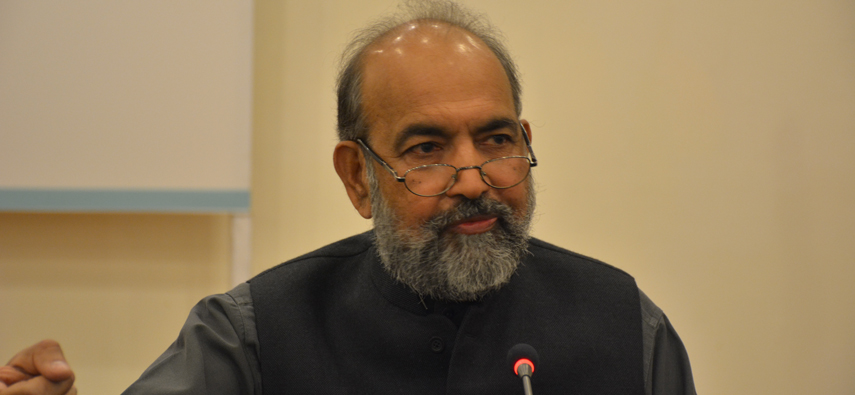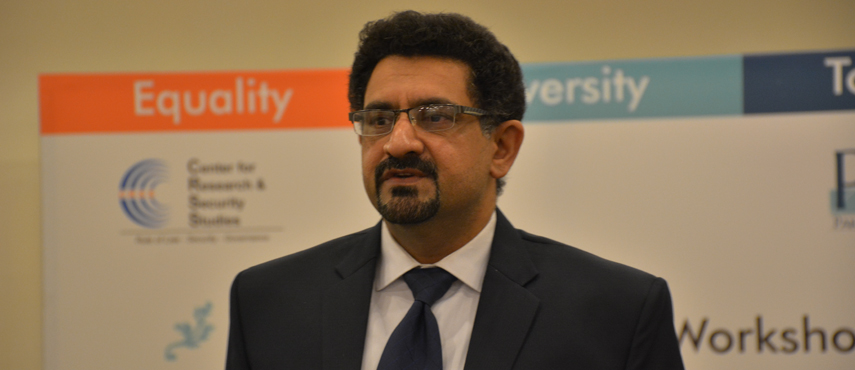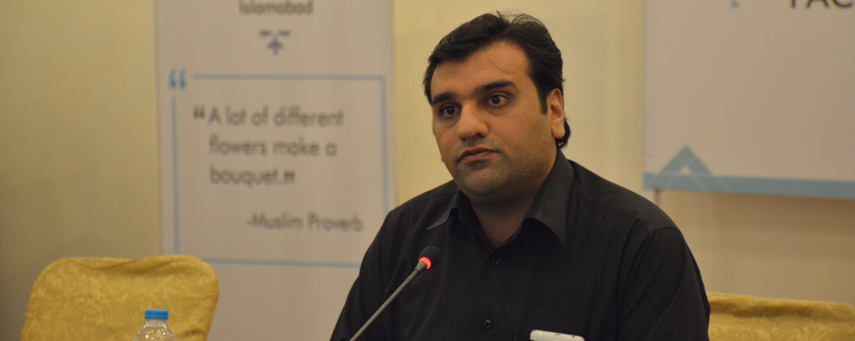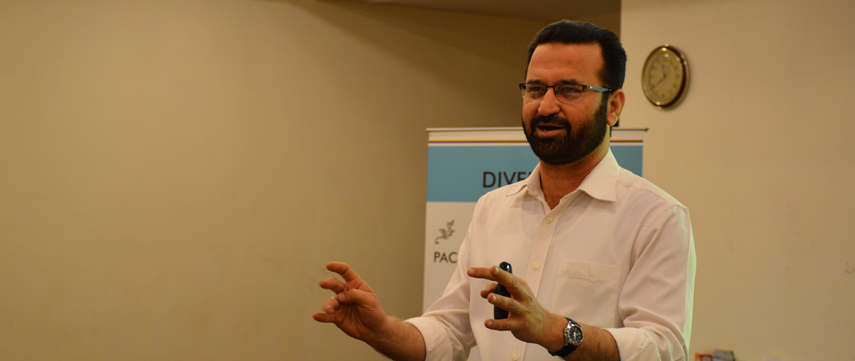The Center for Research and Security Studies (CRSS) conducted the fourteenth three-day PACE collaborative workshop for young university lecturers and professors between March 10 -12, 2017 at Hill View Hotel, Islamabad. The workshop was conducted under the umbrella of the Pakistan Center of Excellence (PACE), a counter-radicalization, pluralistic values focused project, in collaboration with the Dutch Government. Participants included young university lecturers and professors from University of Swat, Bahiria University, Government College of Commerce and Management Sciences, Sargodha University, International Islamic University Islamabad, Mirpur University of Science and Technology, Gomal University, Bahauddin Zakaria University, Sindh University, University of Balochistan and Preston University.
Dr. Khalid Zaheer shared his views on religious intolerance, Ms. Kamla Bhasin threw light on the feminist struggle and gender equality, Dr Qibla Ayaz trained the participants on fundamentals of democracy, governance and accountability, Dr. Zubair Ghouri spoke on respect for diversity, opinions and rights, Mr Ammad Khaliq trained the participants on media and ethics and Mr. Safiullah Gul discussed leadership and motivation strategies in his session.
Opening Ceremony
Mr. Zeeshan Salahuddin, Project Manager, welcoming the participants to the workshop said that the main purpose of inviting a diverse group from all across Pakistan is to gather a wide variety of spectrum from them. Teachers are the real gate keepers of the society because they are shaping future generations and are greatly influencing the lives of their students in multifarious ways.
He said that PACE is an initiative by CRSS to counter radicalization, inculcate critical thinking, question preconceived notions and narratives, and embed a national discourse in constitutionalism and rule of law. He insisted on the role of teachers as gate keepers of future generations equipped with the universal values of adherence to rule of law, respect for diversity, opinions and rights, and ideas of perseverance, coexistence, peace building and tolerance. He said, “I hope that one of the things you will learn over the course of this workshop is, that the right thing to do is often also the much more difficult path to take, but you are the gatekeepers and if you are not going to fight this fight than quite frankly I don’t know who is.”
Serving as the Second Political Secretary for the Australian High Commission in Pakistan for almost two years now, Ms. Rasha Ruhayele, was invited to the opening ceremony as the chief guest. She commended the PACE project for engaging and promoting critical and open discourse on fundamental values such as diversity, rule of law and equality.
While speaking on the perspectives of diversity in Australia, she said that 28% of Australians were born overseas, 20% have a parent who was born overseas and 20% speak a language other than English at home, she highlighted the story of Australia as one of migration. Diversity has become integral to Australia’s identity and its strength as a nation, were apart from Aboriginals and Torres Strait Islander all modern day Australians are immigrants or descendants of immigrants. She emphasized the multiculturalism as a pillar of the Australian society including the dimensions of social reality, public policy and cultural philosophy. The expression of cultural identity and traditions in Australia has always been accompanied by the responsibility to accept democratic values and institutions such as parliamentary democracy, the rule of law, equality as between men and woman, freedom of religion and freedom of speech. She pointed out that failure in applying the rule of law to both state and subjects undermines the fundamental principles of the rule of law and hinders the development of a socially and economically prosperous society. “It is when we respect the rule of law that we ensure individual freedom, collective security, protection of fundamental rights and a stable economic environment,” she said.
Answering a question about the biggest challenges the Australian society is facing these days and what the Australian government is doing to overcome them, Ms. Ruhayele pointed to the importance of education in basic values such as acceptance, tolerance and equality. An early education for children through their families and schools to ensure the internalization of these values and foster their implementation in everyday encounters in order to overcome these issues which, despite the progress that has already been made, still plague Australia. Later she connected education and basic values to play an important role in countering extremism as well.
Another question was about whether Aboriginal people have been treated with equality and tolerance in the past and if they do get their rights now. Mrs. Ruhayele said: “Aboriginal people have a lower life expectancy than other Australians which is one of the major issues and is reflected in problems that stem from social, medical and educational issues, but there has been a shift in how we approach this within our laws and the general population and it’s an issue that’s being debated in the Australian parliament and among the Australian people. So it’s a very sensitive matter we couldn’t solve yet, but we are working on.”
Mrs. Ruhayele responded to a question about globally raising nationalism and far right politics: “I think one of the most important things – for all of us as citizens of our own countries and of the globe – is to ensure that you remain true to tolerance, diversity and rule of law. These are the things that matter the most. So well, other people might have particular views on certain things, but I think it is important to make sure that this voice remains heard.”
Dr. Khalid Zaheer opened the first session of the day and shared his opinion about “Religious Intolerance” with the participants. He said that religious tolerance is the right one should give to others to believe in and practice faith of their choice. “I cannot impose my views on others. It is as simple as that. What I think is, that there is enough content in the religious text of ours that convinces us to make us genuinely tolerant towards others.” He also explained how the closed environment of most of the religious groups cuts people off from rest of the world as for its communication concerns. In that religious environment you are given one sided information and people are not encouraged to ask questions, which can makes a person extreme, intolerant, not welcoming other views and not talking to others with an open mind. He said, “I am perfectly convinced that terrorism is a subset of extremism. Terrorists emerge from a larger group of people called extremists. You want to arrest terrorism, you got to eliminate extremism.” According to Mr. Zaheer, one basic requirement for not becoming extreme in our beliefs and the practice of our faith, is to use our intellect. Emphasizing the importance of such, he quoted from the Holy Quran: “Why do they not ponder and reflect upon the Holy Quran? (Surah 4, Verse 82). The worst beasts in the eyes of the God are those deaf and dumb people who don’t use their intellect” (Surah 8, Verse 22). A certain environment is created in which people are brought in and there are some outstanding speakers who are able to influence the hearts and minds of the people. He pointed out that this environment needs to be broken. People need to understand that this life is a trial and we all have got to know what the truth is and for that purpose you got to use your own mind, you got to ask questions. And when you start doing it you cannot be an extremist. You will be tolerant because you can understand that the other person is also going through a process which you are going through.
Mr. Zaheer pointed out further, that every Quranic verse has to be seen in the overall context, because the message of God is one coherent, consistent message; that is what the Quran claims in 4th Surah, Verse 82. There is no contradiction in the Quran; there is contradiction in the manner we understand the Quran. Therefore, he concluded, that one of the most important principles of understanding the religion is, that the understanding that you are given has got to be consistent with the rest of the message of the Quran; if it’s not, it’s not a correct understanding. Furthermore, he said, that we must encourage people to search for the truth because our claim is that Islam, the message of God, is the truth from God. And truth is not something which is forced upon others; truth is something that dawns upon others.
Asked about his view on the creation of a state based on religion in conjunction with the inevitable marginalization of religious minorities, Mr. Zaheer said, “My ideal is that we should have a society which is based purely on democratic principles. There should be freedom of expression, respect for all individuals and the freedom to choose and reject religious believes. If you go by this understanding, you can have a state, which by its majority chooses to call itself a religious society. It’s a democratic right of that society, but it must be assured that the rights of those who belong to the minority are not taken away from them, they got freedom of choice and the majority understanding is not imposed on them. At the same time, people belonging to the majority religion should be freely allowed to leave it if they feel not convinced.”
Dr. Qibla Ayaz kicked off the workshop’s first session on the first day and discussed the topic of ‘Fundamentals of Democracy, Governance and Accountability’. He stimulated the discussion relating it to the current socio-political situation of the Pakistan in wake of Panama Leaks, NAB, and accountability commissions. He also compared and contrasted the new form of electoral democracy that has taken birth in USA, entirely different from that of eight years back election when Obama was elected. Now USA is more focused on localization by restricting the domestic politics to white people.
He took the participants back in the history of democracy that has evolved through different stages. The citizens have experienced different forms of governments in the past such as aristocracy, dictatorship, and dictatorship of the religion. Islamic history has also gone through the same phases; such as dynastic rule by a few families. Across these historical phases, democracy has emerged as the best state system. Among other forms of democracy are parliamentary and presidential systems.
Fostering discussion around aspects of democracy i.e. outward and inward appearances, he said that the outward appearance is the structural election process whereas inward appearance deals with the accountability of the representatives of the people. The inward appearance is the spirit of the democracy. Accountability is a prerequisite for democratic systems. Talking about lack of sustainability of democracy in Pakistan, he said that democracy has not failed in Pakistan but it has always been portrayed as a failed system. Democracy stabilizes with able leadership and this is what we lack in Pakistan. Good governance can emerge only if democracy is mature and stable. Good governance is based on social justice, rule of law, and provision of fundamental human rights.
Under the topic of ‘Respect for Diversity, Opinions and Rights’, Dr. Zubair Ghouri kicked off his session with the statement: “Pakistanis are one of the most intolerant people in the world, which indicates that we have certain inclinations, certain prejudices that we safeguard even at the expense of our lives.” In this way he challenged the participants to question their own status of respect towards diversity and differences among the people such as different appearance, political, ethical, linguistic or ideological association and to become clear about their very own biases.
“Disagreement is the essence of any discourse. If everybody is agreeing with every other person we cannot grow as a society, as a culture and as a community. But this disagreement should initiate a healthy debate. The problem comes when we become violent, abusive and disrespectful.”
Mr. Ammad Khalique kicked off his session on “Media & Ethics”. He started with the definition of “Media” and “Ethics”, media is the collective communication outlet or tool that is used to store and deliver information or data. Specialized mass media channels include print media, social/digital media, photography, advertising, cinema, and broadcasting (Radio, TV). Speaking on the freedom of expression, he referred to the Article 19 of UN Charter, “Everyone has the right to freedom of opinion and expression; this right includes freedom to hold opinions without interference and to seek, receive and impart information and ideas through any media and regardless of frontiers.”
He defined ethics as the way people behave based on their beliefs about what is right and wrong and how it influences their behaviors and values. He shared his views on ethics in journalism with the following points:
- Seek truth and report it
- Minimize harm
- Act independently
- Standards of Decency
- Be accountable
He also said that being neutral and presenting authentic news is one of the values that should be kept in mind while reporting certain issues. Media is bound in some cases and cannot be open and expose the facts. She said that words are sometimes misinterpreted and other times twisted when reporting sensitive issues; therefore, extreme care should be taken while debating on such issues. He stressed that the reporters while broadcasting should use decent language.
He shared few laws and ethics that are binding upon media:
- Cyber Stalking
- Cyber Bullying
- Cyber Masking
- Cyber Frauds
- Hate Speech
- Defamation
- Intrusion to Privacy
- Harassment
- Cyber Crime Bill 2016
- Cyber Wing (FIA)
Mr. Safiullah Gul was the last speaker of the workshop and spoke on the topic of ‘Leadership and Motivation’. He began with the saying that “he who fails to plan actually plans to fail” and shared stories of people who alone have changed the course of history, with motivation and persistence, despite all the opposition.
He said that successful leadership determines the extent of efforts directed towards a certain goal. He presented his model of goal-seeking i.e. activation, persistence and intensity. Being alone doesn’t actually matter if you have goals and objectives set in your mind. To achieve these goals, you actually need to overcome your fears and insecurities. An individual sometimes can set an example and be motivation for others.
One of the participant commented that motivation is the most important factor to move forward and be successful in life. His session, filled with activities to enhance creative and critical thinking, focused on looking at things from a slightly different perspective to encourage problem-solving.

